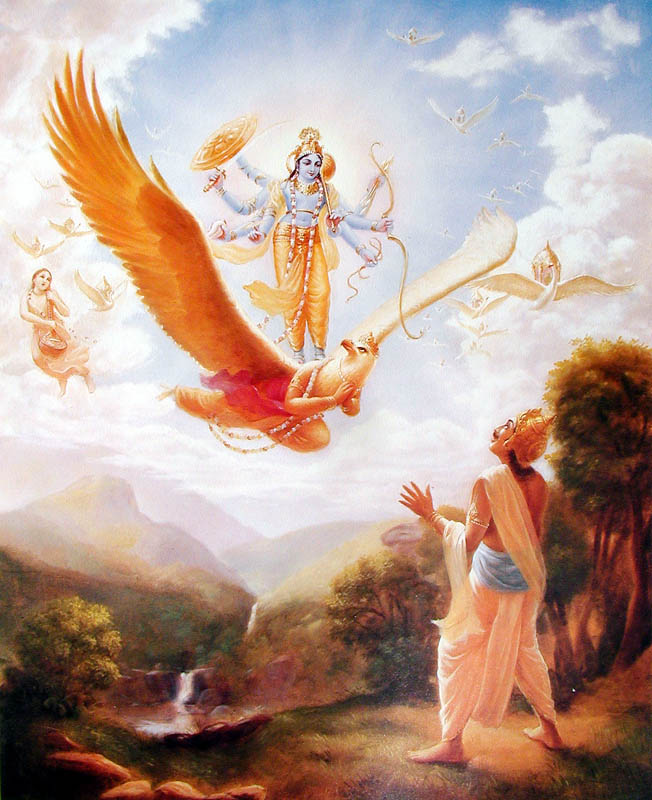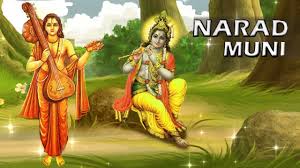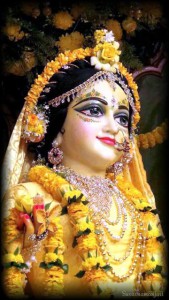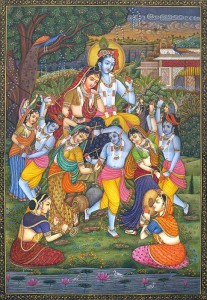When the ten Prachetas emerged from the water and saw how the surface of the earth had become covered by trees, they became very angry. With the desire to burn all of the trees to ashes, the Prachetas produced wind and fire from their mouths, and upon seeing this, Soma came there in order to pacify them.
Being the lord of all kinds of vegetation, Soma felt great compassion for the trees that were being burnt, and so he addressed the Prachetas as follows: “O greatly fortunate ones, you should not destroy these trees, for your duty is to act as the protector of all praja (citizens). The Supreme Lord, Shri Hari, has created these trees and vegetables as eatables for other living entities.”
“Your father, Prachinabarhi, as well as the Supreme Lord had ordered you to generate population, and so how can you burn these trees and herbs to ashes? They are necessary for the maintenance of your subjects and descendents. As the parents maintain their children, as the eyelid protects the eye, as the husband takes care of his wife, as the householder maintains beggars, and as the learned guide the ignorant, so the king is the protector of all his subjects.”
“These trees are also citizens within the kingdom, and so I request you to control your anger and give them protection. The Supreme Lord is situated within the hearts of all moving and non-moving entities as the Paramatma, and thus every form of material body is a temple of the Lord. You should satisfy the Lord by adopting this exalted vision and thus refrain from killing these living entities in the form of trees. Let the remaining trees be spared.”
“O princes, take this well-qualified girl named Marisha, who was raised by the trees. You may accept this beautiful girl as your wife.”
In this way the Prachetas became pacified, and all of them married the daughter of Pramlocha Apsara, according to religious principles. Then, from the womb of Marisha and due to the combined semen of all of the Prachetas, Daksha was born. From his mind, Daksha first of all created various demigods, demons, human beings, birds, beasts, aquatics and other living entities. But, when he saw that his generation of living beings was not as it should have been, he went to a mountain near the Vindhya range, where the holy place named Aghamarshana is situated.
There, Daksha performed very severe austerities and ritualistic ceremonies to satisfy the Supreme Personality of Godhead, and while doing so, he offered the Hamsa-guhya prayers: “Let me offer my respectful obeisances unto the Supreme Personality of Godhead, who is transcendental to the illusory energy and the evidence of experimental knowledge. He possesses supreme will and thus He is the controller of the living entities and the material nature. As the sense objects cannot understand how the senses perceive them- so the conditioned soul, although residing within the body along with the Supreme Soul, cannot understand how the Lord directs his senses.”
“When one’s consciousness is completely purified of the contamination of material existence, both gross and subtle- without being agitated, as in the waking and dreaming states- or without the mind being dissolved as in susupti (deep sleep)- one comes to the platform of trance. At this time, one’s material vision, and the mental memories that manifest various names and forms are vanquished. Only in such a state of trance is the Supreme Personality of Godhead revealed. Just as great learned brahmanas who are expert in performing sacrifices can extract the fire which is dormant within wood by chanting the fifteen Samidheni mantras- so those who are advanced in terms of pure consciousness (Krishna consciousness) can find the Paramatma situated within their hearts. When will that Supreme Personality of Godhead become pleased with me?”
“The Supreme Brahman, Krishna, is the ultimate source of everything. He does everything, whether He personally acts or causes others to act, and thus He is the cause of all causes. Acting from within the cores of the hearts of philosophers that propagate various views, He causes them to forget their own souls while sometimes agreeing and sometimes disagreeing among themselves. Thus, He creates within this material world a situation in which such philosophers are unable to come to a conclusion. As the air carries the characteristics of the physical elements, such as the aroma of a flower or colors resulting from a mixture of dust and air- so the Lord appears through lower systems of worship according to one’s desires, although He appears as the demigods and not in His original form. What is the use of these other forms? May the original Supreme Personality of Godhead please fulfill my desires.”
The Supreme Lord, Who is extremely affectionate toward His devotees, became very pleased by Daksha’s prayers and thus He appeared at the holy place of Aghamarshana. The Lord’s lotus feet rested upon Garuda’s shoulders, and in His eight hands He held a disc, conch shell, sword, shield, arrow, bow, rope and club. His deep bluish body was covered by yellow garments, and His face appeared to be very cheerful. From His neck to His feet hung a long garland and His entire body was decorated with uncommonly beautiful ornaments.
The Lord was accompanied by great devotees like Narada, and the principle demigods, headed by Indra. Situated on both sides of the Lord, and behind Him as well, these devotees continuously offered Him prayers. At first, when Daksha saw the wonderfully effulgent form of the Lord, He became somewhat afraid, but then, with great pleasure, he fell down onto the ground like a stick to offer his respectful obeisances. As rivers become filled with water that flow down from a mountain, all of Daksha’s senses became filled with pleasure due to seeing the Lord, and because of that ecstasy, he could not say anything, but remained lying upon the ground.
The Lord knew of the desire within Daksha’s heart, however, and so He mercifully addressed him as follows: “O most fortunate Prachetasa, because of your great faith in Me, you have attained the supreme devotional ecstasy. Indeed, because of your austerities, combined with devotional service, your life has become successful. My desire is that everyone within this world become happy and you also performed austerities for the welfare of the universe. I am thus very pleased that you endeavored to assist Me in fulfilling My desire in this way. For this reason, you prajapatis, who are expansions of My marginal energy, are also considered incarnations of My various qualities.”
“My dear Daksha, Prajapati Panchajana has a daughter named Ashikni, whom I wish that you accept as your wife. By uniting in sexual intercourse, you will be able to beget hundreds of children, and thus increase the universal population. These children will also become captivated by My illusory energy, and thus, like you they will engage in sexual intercourse. However, due to My mercy upon you, as well as them, they will also be able to worship Me in devotion,”
After speaking to Daksha, Lord Vishnu immediately disappeared, as if He were an object experienced in a dream. Thereafter, impelled by the illusory energy of the Lord, Daksha begot 10,000 sons named the Haryashvas, in the womb of his wife, Ashikni. All of these sons were very gentle and obedient to their father. When Daksha ordered them to beget children, they went to a place of pilgrimage named Narayana-saras, toward the west, where the River Sindhu meets the sea.
In that holy place, the Haryashvas regularly bathed in the holy lake. Having thus become purified, they became inclined towards the activities of the paramahamsas. Nevertheless, because their father had ordered them to beget children, they performed severe austerities for that purpose.
Then, one day, Narada approached the boys and said, “My dear Haryashvas, you have not yet seen the limits of this earth. There is a kingdom inhabited by only one man, wherein there is a hole from which having entered, no one emerges. A woman there, who is extremely unchaste, adorns herself with very attractive dresses and ornaments, and the man who resides there is her husband.”
“In that kingdom there is a river that flows in both directions, a wonderful house made of twenty-five ingredients, a swan that vibrates various sounds, and an automatically revolving object made of sharp razors and thunderbolts. Since you inexperienced boys have not seen all of this, you are devoid of advanced knowledge. Considering this, how will you create progeny? Your father is omniscient, but you do not know his actual order. Without knowing the real purpose of your father, how will you create progeny?”
After hearing Narada’s enigmatic words, the Haryashvas considered them with their natural intelligence. Without taking help from others, they understood the meaning as follows: The earth refers to one’s field of activities, or material body; and the only male is the Supreme Personality of Godhead, Who is actually the sole enjoyer. The hole refers to the lower planetary systems, called bila-svarga, for hardly once has a person entered there and returned. Being influenced by the mode of passion, the conditioned soul’s unsteady intelligence is like a prostitute, who repeatedly changes her dress just to attract one’s attention.
The husband of the prostitute is the conditioned soul who possesses the impure intelligence by which he loses all independence. The river refers to material nature, which functions in two ways, for creation and dissolution. One who is submerged in the river of maya may get free by coming to the banks of knowledge and austerity, but the current is swifter near the shore. The house made of twenty-five elements refers to the cosmic manifestation, the swan is one who can discriminate between matter and spirit, and its vibrations represent the words of shastra. The object made of sharp blades and thunderbolts is eternal time, which relentlessly drives the activities of this material world. The Haryashvas understood shastra to be their real father, and by not knowing its purpose, one is truly ignorant.
The Haryashvas became fully enlightened about the value of spiritual life, due to hearing Narada’s instructions. Having all reached the same conclusion, they accepted the great sage as their spiritual master and after circumambulating him, they followed the path by which one never returns to this material world.
Narada had known that the Haryashvas were eligible for liberation, due to having become purified by living in a holy place, and performing austerities. Narada therefore thought, “Why should these boys be encouraged to become entangled in family life, which is so dark that, having once entered, one cannot leave it?”
Thus, the great sage had approached the Haryashvas and discouraged them from following their father’s instructions, so that they could instead search for the Supreme Lord, Who is situated within the core of the heart. After delivering the Haryashvas, Narada continued traveling throughout the universe, his mind always fixed at the lotus feet of the Lord.
When Narada personally came and informed him of how his sons had gone back home, back to Godhead, Daksha lamented bitterly at the loss. Lord Brahma was able to pacify him with good instructions, however, and so Daksha thereafter begot one thousand more sons named Savalashvas, in the womb of his wife, Panchajani. After being ordered by their father to beget children, this second group of sons also went to Narayana-saras to perform austerities.
By regularly bathing in the sacred lake, their hearts became cleansed, and while subsisting only upon water and air for several months, the Savalashvas recited the following mantra: “Let us offer our respectful obeisances unto Lord Narayana, the Supreme Personality of Godhead, who is always situated in His transcendental abode.”
Once again Narada approached Daksha’s sons and instructed them in absolute knowledge, by speaking enigmatically as before. After encouraging the Savalashvas to follow the path of their elder brothers (the Haryashvas), Narada Muni, whose merciful glance never goes in vain, departed. By the mercy of Narada, the Savalashvas gave up their aspiration to produce children and fully engaged in the activities of Krishna consciousness. Like nights that have gone to the west, these sons of Daksha have not returned even until now.
At this time, Daksha began to observe many inauspicious signs. Then, when he heard from various sources that his second group of sons had also come under the influence of Narada’s instructions, he became overwhelmed by grief and highly enraged. It is the nature of materialistic parents to feel that their children are being deprived of the enjoyment of life if they take to Krishna consciousness, and thus they become very angry and accuse the devotees of being the enemies of society.
Narada knew that the time of bereavement is very suitable for appreciating the principles of devotional service, and so he took the opportunity to approach Daksha, with the hope of delivering him from the materialistic way of life. However, as soon as Daksha saw Narada before him he began to chastise him with harsh words, his lips trembling with rage.
Daksha said, “You wear the dress of a saintly person, but in reality you are a fraud. By showing my innocent sons the path of renunciation, you have proved yourself to be shameless and devoid of compassion, and you have done me a great injustice.”
“My sons had not yet absolved themselves from their obligations to the demigods (by performance of sacrifice), the rishis (by the execution of brahmacharya), and their father (by begetting children), and thus you have obstructed their progress towards good fortune in this world and the next. Because you have committed violence against others, while claiming to be an associate of Lord Vishnu, you are defaming the Supreme Personality of Godhead. How can you dare to pose as one of the personal associates of the Supreme Lord, while at the same time performing abominable activities? Are you not ashamed? The actual devotees of the Lord are very kind to the conditioned souls and are eager to benefit them. Although you wear the dress of a devotee, you create enmity with people who are not inimical towards you, and you break ties between family members and friends.”
“You seem to think that simply by awakening a sense of renunciation one can become detached from this material world. But, in my opinion, full knowledge must be awakened first. Otherwise, the mere changing of dress cannot bring actual renunciation. In spite of the fact that material enjoyment is the cause of all kinds of unhappiness, it cannot be given up until one has experienced this truth for himself. Therefore, one should be encouraged to remain on the platform of material enjoyment while simultaneously advancing in knowledge, so that the illusion of material happiness may one day be understood. In this way, without help from others, one can experience how abominable material life is.”
“Those whose minds are changed due to being influenced by others do not become as renounced as those who have learned from personal experience. Although I live a household life, along with my wife and children, I follow the Vedic injunctions and thus enjoy life without sinful reactions. Unfortunately, you have greatly displeased me by needlessly misguiding my innocent sons. I could tolerate this once, but since you have again done the same abominable thing, you must be considered a rascal who does not know how to behave towards others. You may be able to travel all over the universe, but I curse you to have no residence anywhere.”
The fault in Daksha’s argument is that, in spite of directly experiencing the miseries of material existence, due to the strength of material desires, one cannot give them up. In other words, material nature is so strong that, in spite of suffering at every step, one does not give up his attempts to enjoy sense gratification. The fact is that only by the association and blessings of a pure devotee like Narada can one’s dormant spirit of renunciation be awakened.
After being cursed by Daksha, Narada replied, “tad badham”, (“so be it”). Although he could have counter-cursed Daksha, Narada did not do so because he is a tolerant and merciful sadhu. The fact is that Daksha’s curse was a great boon for a preacher like Narada, who travels all over the world for the benefit of human society.
Thereafter, at the request of Lord Brahma, Daksha begot sixty daughters in the womb of his wife, Ashikni, so that there would be no chance for Narada to lead them towards the path of renunciation. Daksha gave ten daughters in marriage to Dharmaraja (Yamaraja), seventeen to Kashyapa, twenty-seven to Soma, and two each to Angira, Krishashva and Bhuta.
From the wife of Yama named Sadhya was born the Sadhyas, and from his wife Vishva came the Vishvadevas. From Yama’s wife, Muhurta, the Mauhurtikas were born. These demigods deliver the results of actions to the living entities, during their respective allotted times.
From the wife of Yama named Vasu came the eight Vasus, headed by Drona; and the wife of Drona named Abhimati gave birth to Harsha, Shoka, Bhaya and others. From Krittika, a wife of the Vasu named Agni, Skanda (Karttikeya) was born; and from Sarvari, the wife of the Vasu named Dosha, was born Sishumara, an expansion of the Supreme Personality of Godhead. From Angirasi, the wife of the Vasu, Vastu was born the great architect Vishvakarma; and his wife, Akriti gave birth to Chakshusha Manu.
Sarupa, the wife of Bhuta, gave birth to the eleven Rudras, and her co-wife gave birth to the ghost and hobgoblin associates of Rudra. From Sati, the wife of Angira, the Atharvangirasa Veda was born. The wife of Kashyapa named Patangi gave birth to many kinds of birds; and another wife, named Yamini gave birth to locusts. Vinata gave birth to Garuda, the carrier of Lord Vishnu, as well as Aruna, the charioteer of the sun-god; and Kadru gave birth to many serpents.
The wives of Kashyapa are the mothers of almost the entire population of the universe. From his wife, Timi, the aquatics took birth; and from Sharama, the ferocious animals like lions and tigers were born. From Surabhi, the cow, buffalo and other animals with cloven hooves took birth; and from Tamra were born eagles, vultures and other large birds of prey. From Kashyapa’s wife, Muni, the Apsaras were born; and from Krodhavasa, various serpents and mosquitoes took birth.
The varieties of trees and creepers were born from the womb of Ila and the Rakshasas, and evil spirits took birth from Surasa. The wife of Kashyapa named Arishta gave birth to the Gandharvas, and animals such as the horse were born from Kastha. Danu gave birth to sixty-one sons, of which eighteen are prominent, including Sambara, Arishta, Hayagriva, Vrishaparva, Dhumrakesha, Virupaksha, and Viprachitti.
Vrishaparva’s daughter, Sharmishtha was given in marriage to King Yayati, the son of Nahusha. Danu’s son, Vaishvanara had four beautiful daughters- Upadenavi married Hiranyaksha, Hayashira married Kratu, and Kashyapa married the other two, Puloma and Kalaka. From these two were born the 60,000 Nivatakavachas, Paulomas and Kalakeyas that were killed by Arjuna. Through his wife Simhika, Viprachitti begot one hundred and one sons, headed by Rahu (the other one hundred are known as Ketus).
The twelve sons of Aditi were Vivasvan, Aryama, Pusha, Tvasta, Savita, Bhaga, Dhata, Vidhata, Varuna, Mitra, Shatru and Urukrama.
Samgya, the wife of Vivasvan gave birth to the Manu named Sraddhadeva, as well as the twins Yamaraja and the River Yamuna (also called Yami). While wandering over the earth in the form of a mare, Yami gave birth to the Ashvini-kumaras. Another wife of Vivasvan named Chaya begot two sons named Sanaischara and Savarni Manu, as well as one daughter, Tapati, who married Samvarana. From Matrika, the wife of Aryama, many learned scholars took birth, and from them Lord Brahma created the human species, which is endowed with an aptitude for self-examination. A daughter of the Daityas named Rachana was married to Prajapati Tvasta, and she gave birth to two very powerful sons named Sannivesha and Vishvarupa.



